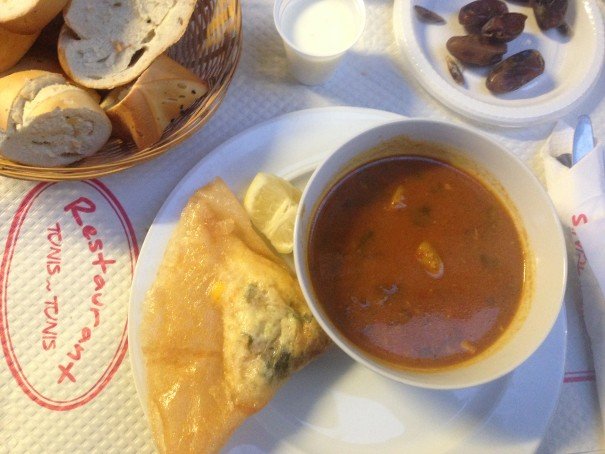
Ramadan Mubarak!

Ramadan Mubarak!
Iftar in Belleville
For most of the year, Tunis Tunis might be an unassuming cantine, but during Ramadan it’s one of the most sought after addresses for iftar, the sunset meal that breaks the daily fast during the month-long Muslim celebration. The modest neighborhood haunt is situated on the Boulevard de Belleville, the main artery of the northern-eastern Parisian quartier vaunted for its ethnic and religious “mosaic.” Belleville is home to the city’s second Chinatown and large communities of Jewish and Muslim Maghrebins as well as sub-Saharan Africans. The restaurants and cafés that anchor the precinct reveal this diversity: halal establishments are scattered between others proudly bearing the kosher Beth Din certification.
You can’t get closer to the original meaning of breakfast than iftar. Like its English equivalent, it literally means “breaking the fast” in Arabic and outside of Ramadan is also used for the morning meal. Partaking in iftar has become something of a ritual for many local residents, Muslim or otherwise. With the city’s Muslim population estimated at 1.7 million, including large clusters around Belleville and Goutte d’Or, in Paris’ northeast, Ramadan is a big deal.
Tunis Tunis lays out countless extra tables on the footpath each night to cope with the extra demand. As sundown approaches, each is pre-set with plates of dates and small plastic cups of yogurt. The café quickly fills with hungry diners, who eagerly check their phones and watches until given the ok to cease fasting. The large crowd is mixed: families, couples, groups of hip 20-somethings, locals, and the odd tourist. This is gastronomic democracy: everyone gets the same set menu, served with a joke on the side by the friendly staff, who will always find space for those who turn up late. The meal starts with a dish of steaming chorba, the spicy, Maghrebin soup with chickpeas, lamb, and cracked wheat, a crispy brick (tuna, egg, capers, and potato encased in a fried pastry shell) nestled between the bowl and the plate.
Seated at a shared table one night last week, we chatted with our neighbors, a young couple whose parents emigrated to France from Tunisia. They tell us that they come here as much for the atmosphere as the food, and it’s true, iftar is a social event that goes beyond what’s on your plates. Sharing this meal is one of those heart-warming moments that proves how easy it is to transcend the boundaries that current-day politics seem all-too-ready to reassert, especially in the tense atmosphere that has cast a pall over Paris in the wake of the Charlie Hebdo attacks earlier this year.
We learn the difference between Tunisian and Moroccan iftar (Moroccans graze throughout the night whereas Tunisians have a big feast) and how in Islamic countries each city adjusts to the inverted day. Discussion turns to Belleville and how it is changing, new bars and shops signaling a new wave, this time not of immigration, but gentrification. They tell us how in the 60s and 70s, when many Tunisians emigrated to France, that as soon as people arrived in Paris they would head straight to this neighborhood, knowing that a network of compatriots and friends-of-friends would help set them up with apartments or jobs.
Although I had no list of people to look up when I arrived in Paris, Belleville also helped me find my feet. It was also the first place where I really felt at home, and food played a big part in that. Freshly arrived from Australia three years ago, I quickly realized how much I had taken for granted the fully-stocked pantry of international ingredients my country, built on immigration, boasts. We, with no centuries-old gastronomic tradition of our own, have an almost prodigious appreciation for exotic ingredients: Ottolenghi, not Childs, is most people’s go-to dinner party inspiration. Although I was by no means complaining about the choice of salted butter or affordably priced goat’s cheese in my new home, I wandered like a lost soul amongst the Monoprix aisles filled with canned cassoulet, searching for familiar items with which to make dinner for my new housemates. Salvation came in the form of Belleville’s Middle Eastern and Asian grocery shops. Inching my way between perilously stacked sacks of couscous, shelves overflowing with spices, giant tubs of harissa, and preserved lemons, I breathed a sigh of relief. Here was something I could work with.
Food can be a lifeline in an unfamiliar world, where you are set adrift on an ocean of foreign flavors. Belleville might not be the harmonious utopia it’s sometimes made out to be, but for myself and many others, it has given us the opportunity to literally taste worlds that are far from our own, while reconnecting us with our roots. Ramadan Mubarak!